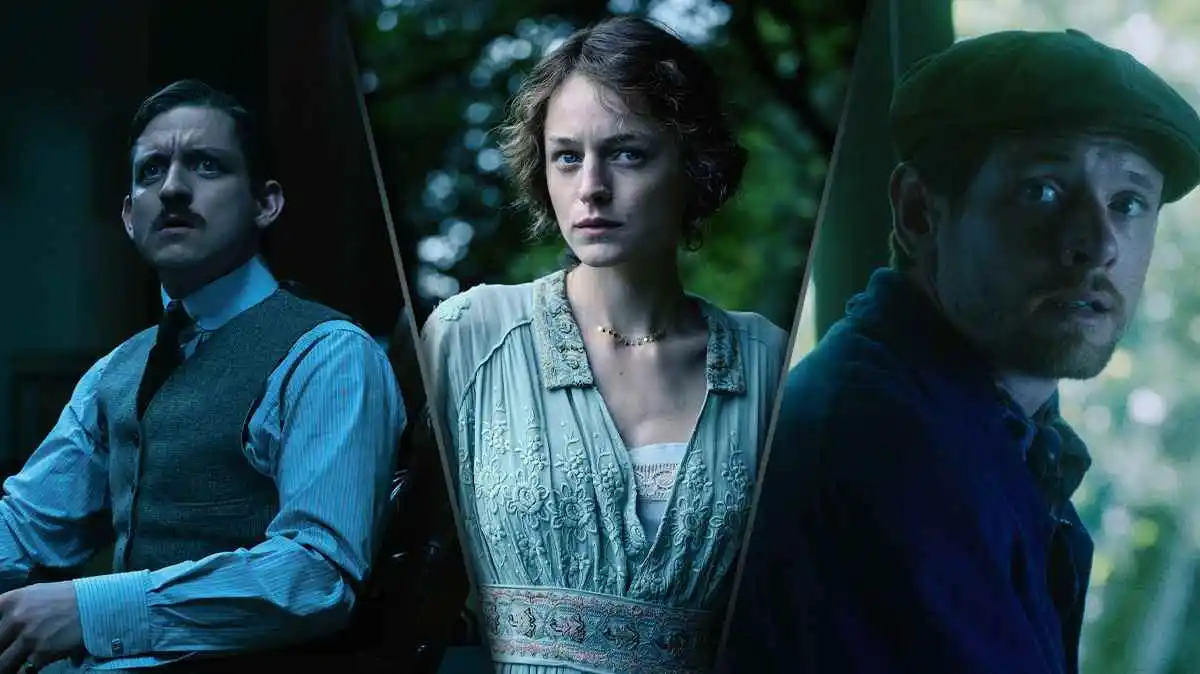Synopsis
Based on the book by D.H. Lawrence, Lady Chatterley’s Lover (2022) follows the curious marriage of Baronet Clifford and Lady Constance “Connie” Chatterley. Following a whirlwind romance, Constance “Connie” Reid marries the handsome Clifford. But there was a cloud in the blue sky of their happiness: Clifford had to leave for war the next day. Sure of their love and the permanence of their vows, the two consummate their marriage, and Clifford leaves for Germany the next day.
Weeks later, Clifford returns from war, paralyzed from the waist down and with an ego that is more fractured than his body. True to her vows, Connie sticks with him and becomes his primary caregiver. But when better vanishes and worse becomes the enduring reality, Connie opens up to another man: her husband’s gamekeeper.
Analysis
Stories are beautiful things, giving life to the lifeless, hope to the hopeless. With them, we shed our skin, put on someone else’s, and experience how it feels to be them. Stories also recalibrate our moral compass—and, just like Lady Chatterley’s Lover (2022), make us wonder if the “villain” is maybe misunderstood.
Connie is not your textbook antihero. Yes, she is flawed. But she is also understanding, loving, and has a specific breed of childish innocence around her. We see it in how she professes that the love she feels for Clifford is forever, despite her history of falling in love too quickly. And in her idealistic notions of sex being, first, an act of love before an avenue for conception, despite being married to an aristocrat, whose family was already eager to have heirs and spares.

With Clifford’s paraplegia, what was initially a love marriage quickly became a marriage of convenience. Though the war took his legs, Clifford’s pride was still as tall and sturdy as ever. And because of this pride, he did not want help from anyone except Connie. And drawing from her inexhaustible well of childish excitement, Connie put her all into caring for her husband.
It was beautiful to watch.
When they arrived at Wragby, the Chatterley manor, Clifford declares the house had seen better days. And when Connie says, “We’ll bring her back to life,” one can’t help but get the feeling she is talking about both man and manor.
And it worked for the most part.
She made light of the effort she put in hoisting Clifford in and out of the bath and devoted her afternoons to being Clifford’s typist, editor, and proofreader. She turned the drudgery of pushing Clifford’s wheelchair contraption into a fun game of pushcart. For a while, their checkered reality seemed beautiful. Until it was not.
There are four important lessons we can all take away from this movie.
Marriage is a two-way street

Whether you are dealing with a quadriplegic partner or one that cannot load the dishwasher, marriage is never easy. It forces you to be the best version of yourself. To serve this person and prioritize their happiness. To be there for them through the exhilarating highs and the depressing lows. And they must do the same too. Reciprocity is the bedrock of a successful marriage. Even when it is not feasible to reciprocate on the same scale, reciprocate within your means. It goes a long way.
I think Chatterley’s marriage withered when Clifford stopped seeing Connie as his wife. To Clifford, she was not quite an assistant, but at the same time, not really a wife anymore. Disability is never an easy road to walk. With it, you must relearn yourself and learn new ways of interacting with the world. However, amid all these, it is important to always appreciate and be grateful for the people who give their all daily to make your life easier.
When talking about illness, my mom often says, “onye na-enedo onye na aya aru, sokwa aya aru.” (he that looks after the ailing, ails too.). The Chatterleys were both disabled; one was trapped in a wheelchair, and the other was trapped in the Wragby manor. While her husband’s disability was physical, Connie’s was more internal. She couldn’t enjoy life the way she used to because of Clifford’s situation. But Connie didn’t mind. She made the best of it. Life only started losing its luster when even the simplest, non-sexual intimacies she used to share with Clifford vanished.
Rethinking Intimacy
In our sex-crazed world, it is often impossible to talk about intimacy without talking about sex. Don’t get me wrong, sex is an essential part of marriage. However, it is not everything. Intimacy is what is left when the libido wanes, the butterflies hibernate, and the excitement dies down.
I feel Clifford gave up on the marriage when he lost use of his third leg. He didn’t see the point of trying anymore. However, for practical reasons, he remained married to Connie. And while he took her time, energy, and sometimes happiness, he didn’t feel the need to give her anything back. (I guess suggesting she get a lover was him attempting to give back—while getting something too). They didn’t speak. Whenever she tried to make deep conversations, he stonewalled. He didn’t let her touch him, and neither did he touch her. Their marriage was a sexless, loveless utilitarian entity that got grayer with each new day.
I understand many men tie their self-worth to their performative abilities. However, while watching Lady Chatterley’s Lover (2022), I couldn’t help but wonder if we, as a society, need to rethink intimacy. Is intimacy always a function of coitus, or can it exist independently? Does marriage become pointless without the steam of intercourse? Or is there something else, something intangible but enduring, that keeps it going?
Disability Doesn’t Get Better With a Higher Tax Bracket
It is often said that it is better to cry in a Rolls-Royce than on a bicycle. However, people forget one important bit: you are still crying in both scenarios. I’ll admit when you have access to more resources, you can simulate mobility with various devices. However, it is still not the same. Your loved ones are still in pain. You still have to rely on others to help you with basic things—things you used to do unconsciously. And it hurts on so many levels.

Lady Chatterley’s Lover (2022) was written in a way that makes it easy to hate Clifford. Between the Hitler-esque mustache and his dismissiveness of Connie, Clifford is easy to hate. And this is one aspect of the film that gives me pause. If Clifford hadn’t been so unlikeable, Connie’s infidelity might have been scandalous. However, I tried to step away from Connie’s dominant POV and into Clifford’s at different points.
Imagine waking up and forgetting your disability for a moment. You feel your legs and try to swing them off the bed, but they don’t budge. They lay there like kindling, and everything rushes back. You went to war and got a permanent souvenir. You hear Connie in the other room. She’ll be with you soon, she says. She just has to get some towels. You feel the burn of urine in your bladder.
Hot, urgent.
But you cannot relieve yourself. You must wait for Connie to take you to the chamber pot. Either that or you wet yourself. She is taking too long. You can’t hold it anymore. Needling tears sting your eyes as the smell of ammonia hits your nostrils. Connie comes in just then, arms filled with towels. Her face falls briefly when she sees the wet patch. She perks up and acts like it’s nothing. But it’s too late. That weary expression will always haunt you.
Don’t Introduce a Vibe You Cannot Sustain

Many things make me shout at my screen while watching a movie. Caucasian characters “checking out” an obviously haunted house. Dorky pubescent female protagonists publicly professing love to their crushes. However, Clifford asking Connie to find a lover and get pregnant by said lover takes the crown. From the precision of his demands and suggestions, it was apparent the mustachioed baronet had thought about this for a long time.
- No one must know about the affair.
- He (Clifford) did not want to know who the lover was
- The lover was essentially a sperm donor, and the baby would be—to the best of everyone’s knowledge—a Chatterley.
- And most importantly, she mustn’t fall in love with said lover.
For someone so austere, this proposition was oddly liberal. Based on his station and my initial perception of his character, I felt Clifford would try to have a child. So I was shocked when he—more or less—said he didn’t mind raising a child that wasn’t his. However, when Connie started warming up to the Irish writer, Clifford quickly showed he could not take what he had initially offered. However, he had planted that seed in Connie’s head—and that seed grew when she set eyes on Oliver Mellors.
Verdict
What I loved most about Lady Chatterley’s Lover (2022) was Connie’s character growth. In the first act, she is immature, girlishly sweet, and intent on enjoying life’s pleasures. However, by the end of the third act, she was still sweet but more mature. A recurring theme in cinema—and indeed literature—is of characters being hardened by growth. Connie is an exception. She remains soft, unhardened by the lessons she has learned, and more appreciative of the substantial things in life. I like to think of this movie as a PG-R version of Me Before You with multiple twists. However, it is easily an 8 out of 10 and will force you to reevaluate your perception of marriage—just watch it when the kids are asleep.
Like what you read? For more film reviews, check out Beyond the Physicality of Love: Review of the Swan Princess (1994) and Five Lessons for Humanity: Review of Spirited Away (2001)








You have remarked very interesting points! ps decent web site.
interesting news